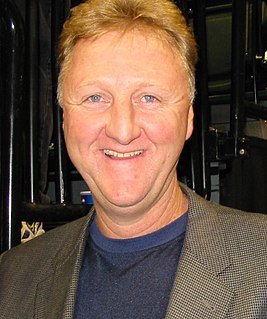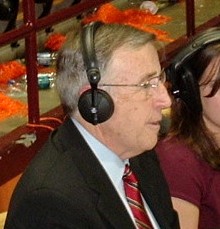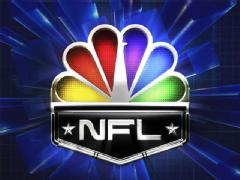This article needs additional citations for verification .(February 2019) (Learn how and when to remove this template message) |
This article needs additional citations for verification .(February 2019) (Learn how and when to remove this template message) |

The American Broadcasting Company (ABC) is an American commercial broadcast television network that is a flagship property of Walt Disney Television, a subsidiary of the Disney Media Networks division of The Walt Disney Company. The network is headquartered in Burbank, California on Riverside Drive, directly across the street from Walt Disney Studios and adjacent to the Roy E. Disney Animation Building, But the network's second corporate headquarters and News headquarters remains in New York City, New York at their broadcast center on 77 West 66th Street in Lincoln Square in Upper West Side Manhattan.

Curtis Edward Gowdy was an American sportscaster, well known as the longtime "voice" of the Boston Red Sox and for his coverage of many nationally televised sporting events, primarily for NBC Sports and ABC Sports in the 1960s and 1970s. His accomplishments include coining the nickname "The Granddaddy of Them All" for the Rose Bowl Game, taking the moniker from the Cheyenne Frontier Days in his native Wyoming.

James Shores Simpson was an American sportscaster, known for his smooth delivery as a play-by-play man and his versatility in covering many different sports. In 1997, he won the Sports Lifetime Achievement Award, and in 2000 he was inducted into the National Sportscasters and Sportswriters Association Hall of Fame.

Richard Alan Enberg was an American sportscaster. Over the course of an approximately 60-year career, he provided play-by-play of various sports for several radio and television networks, including NBC (1975–1999), CBS (2000–2014), and ESPN (2004–2011), as well for individual teams, such as UCLA Bruins basketball, Los Angeles Rams football, and California Angels and San Diego Padres baseball.
Anthony William "Billy" Packer is a former American sportscaster and a published author. Packer spent more than three decades as a color analyst for television coverage of college basketball.

Larry Joe Bird is an American former professional basketball player, former coach, and former executive who most recently served as President of Basketball Operations for the Indiana Pacers in the National Basketball Association (NBA). Nicknamed "The Hick from French Lick," Bird has been described as one of the greatest basketball players and greatest shooters of all time.
"One Shining Moment" is a song written by David Barrett about the NCAA Division I Men's Basketball Tournament. "One Shining Moment" is traditionally played at the end of CBS and TBS's coverage of the championship game of the tournament. The song is played as the winning team's players cut down the nets, to a montage of highlights from the tournament.

Lesley Candace Visser is an American sportscaster, television and radio personality, and sportswriter. Visser is the first female NFL analyst on TV, and the only sportscaster in history who has worked on Final Four, NBA Finals, World Series, Triple Crown, Monday Night Football, the Olympics, the Super Bowl, the World Figure Skating Championships and the U.S. Open network broadcasts. Visser, who was voted the No. 1 Female Sportscaster of all-time in a poll taken by the American Sportscasters Association, was elected to the National Sportscasters and Sportswriters Association's Hall of Fame in 2015.

Brent Woody Musburger is an American sportscaster, currently the lead broadcaster and managing editor at Vegas Stats and Information Network (VSiN) and radio play-by-play voice for the Oakland Raiders.
CBS Sports is the sports division of the American television network CBS. Its headquarters are in the CBS Building on West 52nd Street in midtown Manhattan, New York City, with programs produced out of Studio 43 at the CBS Broadcast Center on West 57th Street.

Greg Gumbel is an American television sportscaster. He is best known for his various assignments for CBS Sports. The older brother of news and sportscaster Bryant Gumbel, he became the first African-American announcer to call play-by-play of a major sports championship in the United States when he announced Super Bowl XXXV for the CBS network in 2001. He is of Creole ancestry. Gumbel is currently a play-by-play broadcaster for the NFL on CBS alongside Trent Green as well as the studio host for CBS' men's college basketball coverage.

Clark Clifton Kellogg, Jr. is the former VP of player relations for the Indiana Pacers, the lead college basketball analyst for CBS Sports, and a former player in the National Basketball Association (NBA).
Seth Davis is an American sportswriter and broadcaster. He is a host on Campus Insiders, and an in-studio analyst for CBS' men's college basketball coverage. He currently writes for The Athletic and is a former writer for Sports Illustrated magazine.

Turner Broadcasting System, Inc. is an American television and media conglomerate, part of AT&T's WarnerMedia. Founded by Ted Turner, and based in Atlanta, Georgia, it merged with Time Warner on October 10, 1996. Among its main properties were its namesake TBS, TNT, CNN, Turner Classic Movies, Cartoon Network and Adult Swim, and TruTV. It also licensed or had ownership interests in international versions of these properties. The headquarters of Turner's properties are located in both the CNN Center in Downtown Atlanta, and the Turner Broadcasting campus off Techwood Drive in Midtown Atlanta, which also houses Turner Studios.

TBS is an American subscription television network that is owned by the Turner Broadcasting System unit of AT&T-controlled WarnerMedia. It carries a variety of programming, with a focus on comedy, along with some sports events, including Major League Baseball and the NCAA Men's Basketball Tournament. As of September 2018, TBS was received by approximately 90.391 million households that subscribe to a pay television service throughout the United States.
The TVS Television Network, or TVS for short, is a syndicator of American sports programming. It was one of several "occasional" national television networks that sprang up in the early-to-mid-1960s to take advantage of the establishment of independent television stations and relaxation of the AT&T Long Lines usage rates.

James William Nantz III is an American sportscaster who has worked on telecasts of the National Football League (NFL), National Collegiate Athletic Association (NCAA) Division I men's basketball, and the PGA Tour for CBS Sports since the 1980s. He has anchored CBS' coverage of the Masters Tournament since 1989 and been the play-by-play announcer on CBS' top NFL game since 2004.

The NFL on NBC is the branding used for broadcasts of National Football League (NFL) games that are produced by NBC Sports, and televised on the NBC television network in the United States.
Major League Baseball on NBC is the de facto branding for weekly broadcasts of Major League Baseball (MLB) games produced by NBC Sports, and televised on the NBC television network. Major League Baseball games first aired on the network from 1947 to 1989, when CBS acquired the broadcast television rights; games returned to the network in 1994 with coverage lasting until 2000. There have been several variations of the program dating back to the 1940s, including The NBC Game of the Week and Baseball Night in America.
Ian Eagle is an American sports announcer. He calls NFL, NBA, and March Madness games on CBS, TBS, NBC and TNT, and Brooklyn Nets games on the YES Network and hosts Full Court Press, a basketball talk show, with former player Kenny Smith on Sirius Satellite Radio. Other announcing experiences include NCAA men's basketball, NBA, tennis, the Army–Navy football games, the Army-Navy basketball games, boxing, and NCAA track and field for CBS. He is a graduate of Syracuse University. He is known as "Bird" or the "Birdman".

The NBA on CBS is the branding that is used for weekly broadcasts of National Basketball Association (NBA) games produced by CBS Sports, the sports division of the CBS television network in the United States. CBS aired NBA games from the 1973–1974 NBA season until the 1989–90 NBA season.
The Major League Baseball Game of the Week (GOTW) is the de facto title for nationally televised coverage of regular season Major League Baseball games. The Game of the Week has traditionally aired on Saturday afternoons. When the national networks began televising national games of the week, it opened the door for a national audience to see particular clubs. While most teams were broadcast, emphasis was always on the league leaders and the major market franchises that could draw the largest audience.
College Basketball on NBC is the branding used for broadcasts of NCAA Division I men's college basketball games formerly produced by NBC Sports, the sports division of the NBC television network in the United States. The network broadcast college basketball games in some shape or form between 1969 and 1998. From 1969 to 1981, NBC covered the NCAA Men's Division I Basketball Tournament. It became the first major network to broadcast the championship game, at a cost of more than US$500,000 in 1969.

College Basketball on CBS is the branding used for broadcasts of men's NCAA Division I basketball games that are produced by CBS Sports, the sports division of the CBS television network in the United States.
Golf Channel on NBC is the branding used for broadcasts of golf tournaments produced by NBC Sports in conjunction with Golf Channel, on the NBC television network in the United States. The network's coverage focuses mostly on the PGA Tour, but also includes major events not sanctioned by the tour, such as the Open Championship and Ryder Cup. NBC also airs some tournaments from other tours to which NBC Sports Group holds the television rights, notably the European Tour.

PGA Tour on ABC is the de facto branding used for telecasts of the main professional golf tournaments of the PGA Tour on the American Broadcasting Company (ABC) television network in the United States. ABC broadcast the PGA Tour from 1966 to 2006. From 1962 to 2009, ABC served as the broadcast home of The Open Championship. The British Open on ABC was the longest-running entertainment program in ABC's history and the last-surviving ABC program to debut in the "circle a" era. ABC also held the broadcast rights of the US Open from 1966 through 1994. and the PGA Championship from 1965 until 1990.

NCAA March Madness is the branding used for coverage of the NCAA Division I Men's Basketball Tournament that is jointly produced by CBS Sports, the sports division of the CBS television network, and Turner Sports, the national sports division of WarnerMedia in the United States. Through the agreement between CBS and WarnerMedia, which began with the 2011 tournament, games are televised on CBS, TNT, TBS and truTV. CBS Sports Network has re-aired games from all networks.
ESPN College Basketball on ABC is the branding formerly used for broadcasts of NCAA Division I college basketball games produced by ESPN, and televised on the American Broadcasting Company (ABC). ABC broadcast select college basketball games during the 1960s and 1970s, before it began televising them on a regular basis on January 18, 1987. As CBS and NBC were also broadcasting college games at the time, this put the sport on all three major broadcast television networks. ABC's final regular college basketball broadcast aired on March 7, 2009.